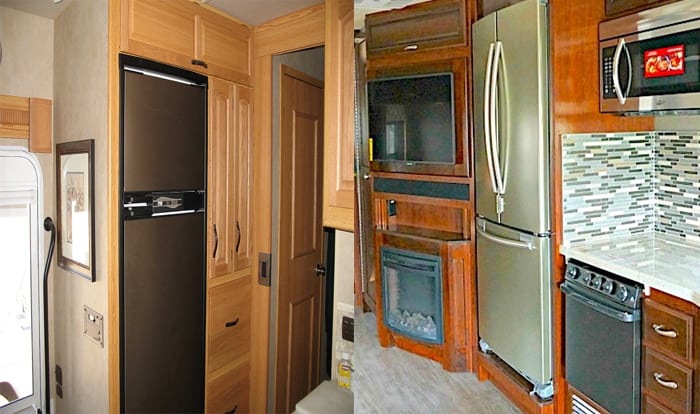An RV residential refrigerator is quite popular as a replacement for an RV fridge, but which one is truly the best? Unlike your house fridge, an RV fridge contains zero moving parts, which means no shoving around while on the move.
Depending on your needs, either one will keep your food cool. Let’s go and check out the differences between an RV fridge vs residential fridge. Our main goal is to guide you on what type of refrigerator suits your lifestyle.
Table of Contents
What You Need to Help You Decide Between an RV & Residential Fridge
To effectively find out the difference between an RV fridge vs. residential fridge, you must keep an open mind. It is imperative to do thorough research about each type, so you can come up with the best decision for your RV. And to help you decide, have the following things handy:
- Brochures of RV fridges
- Brochures of residential fridges
- Prices of RV fridges and residential fridges
In addition, you might want to consult a sales representative for RV fridges and residential fridges.
Factors to Consider in Choosing Between an RV or Residential Fridge
As you shop for a new recreational vehicle, you are likely to wonder if you want a residential fridge in RV or the traditional RV fridge. In fact, many RVers are conflicted about an RV fridge vs. residential, and the decision to buy is not easy.
In order to help you make the right decision, let’s discover the crucial factors to consider in terms of an RV refrigerator vs residential refrigerator.
Factor #1: Electrical Power Needs
A residential refrigerator has its own needs when it comes to power. This type of fridge operates solely on electricity, so make sure that you have a 120 Volt AC power source in your RV.
There must be a breaker as well as an electrical line from the RV panel and an inverter. The inverter is necessary when there is a lack of AC power for your RV.
On the other hand, an RV fridge can survive using various power sources. An RV fridge can be powered by an LP gas, DC power, and AC power.
Factor #2: Cost Of The Fridge
Because of the mass production of residential refrigerators, the cost per unit is affordable. Though there are budget-friendly brands, always remember that the more advanced the features of the appliance, the bigger the price. Plus, as the size increases, the price goes up as well.
But when we talk about RV fridges, their cost is actually higher. This is due to the fact that they are not mass produced, and their availability is limited.
So when the cost matters most to you, a residential fridge is your best bet.
Factor #3: Durability Of The Unit
The residential refrigerators are designed to be situated in homes, and they are not built to be mobile. They are not equipped to handle all the driving and jostling. Plus, these fridges are constructed with multiple parts that do not bode well for their durability on the road.
The RV fridges, however, are developed to withstand bumping, sudden movements, and all types of motion that is expected from an RV ride. When durability is at stake, a traditional RV fridge is your best choice.
Factor #4: Storage Capacity
A residential refrigerator in RV is a practical choice if you are after more storage space for your foods. There are many size options when you look for residential fridges, and you can always find one to fit your RV.
Meanwhile, the traditional RV fridge is usually smaller in dimension, since it is designed to fit a smaller version of a home. The options are limited when it comes to the sizes of RV fridges compared to residential ones.
Factor #5: Weight Of The Fridge
The weight of the fridge may not be something that you think about, but it matters. When you transport a new fridge into your RV, you need a hand cart and extra pair of hands to handle the installation. The RV fridge is lighter since there are no multiple parts inside.
The residential fridge is composed of many parts, so it is considerably heavier. However, a residential unit may be lighter if you opt for a smaller fridge.
Factor #6: Safety And Security
Safety must always be your priority in your RV. Both the RV fridge and residential one has safety concerns that you need to consider prior to purchasing your new refrigerator.
RV fridges usually run on propane, which could be a problem if you don’t have a super secure propane system. The good news is, the RV refrigerator is built for the RV, so it is quite safe.
With the residential fridge, the main concern is that it’s not designed for a mobile home. The installation must be extremely secure, or else the fridge will either fall down or get damaged.
We always remind you to check the ammonia level in the RV fridge before embarking on your latest trip. If you get a whiff of ammonia, you must fix it immediately to prevent the problem from getting worse and extend the usable lifetime of the fridge.
Factor #7: Suitability For An RV Lifestyle
The type of fridge you should purchase must align with the kind of RVer you are. The RV fridge is ideal for overnight camping trips and if you prefer to “dry camp” with zero generator or solar power. It is perfect for a short adventure in the outdoors.
The residential refrigerator is better for you if you live in your RV or you like going on long trips. Additionally, consider a residential unit if you’re okay with purchasing different types of power sources.
Factor #8: Overall Functionality
The RV fridge does not use a compressor to work. Instead, it utilizes an absorption method in order to provide coolness inside the unit. With the mix of heat, ammonia, water, and hydrogen gas, the RV fridge is able to cool down your food.
On the other hand, a residential fridge requires a compressor to function well. This cooling method allows the inside of the fridge to maintain a low temperature, which cools and preserves your food.
Factor #9: General Efficiency
There is a huge difference between an RV and residential fridge when it comes to efficiency. The former is not capable of retaining the low temperature without the power on. In fact, even when connected to a power source, an RV fridge cannot hold on to the coolness when the weather is too hot.
On the other hand, the residential fridge takes a long time to lose the cold temperature inside the unit after the power is turned off. And so when it comes to efficiency, you are better off with a residential fridge.
Conclusion
With an RV fridge or RV residential refrigerator while driving, you can concentrate on the road knowing that you chose the right unit. Hopefully, you now know the difference between an RV fridge vs residential fridge, and which one to choose.
It is extremely important to make an informative decision regarding your appliance, so there are no regrets in the future. Always remember to inspect your fridge regularly, and clean it weekly.
If you enjoyed reading this tutorial, kindly share it with your friends. Please feel free to leave your thoughts in the comment section below.

Hi, I am Joseph. Carpe diem! Seize the day! That’s always been my life motto. If you haven’t seen some of the most beautiful places in the country, you are missing out on incredible adventures.




